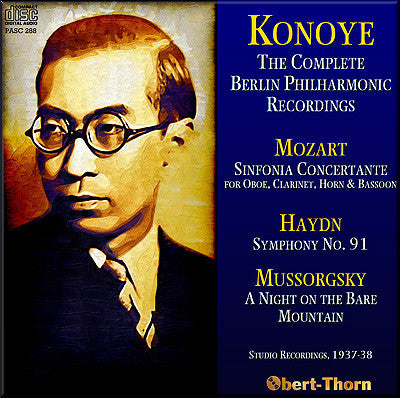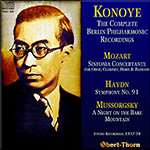
This album is included in the following sets:
This set contains the following albums:
- Producer's Note
- Full Track Listing
- Cover Art
Konoye is masterful with a superb Berlin Philharmonic
Rare sides included in Obert-Thorn's new complete transfers
Konoye's earliest recordings were made with the New Symphony Orchestra of Tokyo for Japanese Parlophone starting in the 1920s. The most significant item from these sessions was a Mahler Fourth from 1930, the première recording of the work and the first complete electrical inscription of any Mahler symphony. The orchestra plays with a decidedly rough ensemble, and things are little better in a series of discs with a seemingly under-rehearsed La Scala Orchestra from 1931 which include a complete Beethoven First Symphony.
The present series of recordings was the first Konoye made with a world-class orchestra. His association with the Berlin Philharmonic dated back to 1924, and his conductorial studies under Muck and Kleiber solidified his links to Germany and its symphonic tradition.
The recording of the Mozart cuts the fifth variation in the finale to fit the work onto seven sides, although the eighth side in the set was left blank and the work could have been accommodated complete. The Haydn symphony was fit on six 10-inch sides by omitting most of the repeats. The anthems disc was presumably made to celebrate the Axis alliance between Germany and Japan. (The "Horst Wessel Lied" was routinely appended to the German national anthem during the Hitler era. Not surprisingly, these tracks have remained un-reissued in previous Konoye compilations.)
The sources for the transfers were laminated French Columbias for the Mozart and German Polydors for the Haydn symphony and the Mussorgsky. The rare anthems sides came from secondary sources provided by a Japanese collector.
Mark Obert-Thorn
-
MOZART Sinfonia Concertante for Oboe, Clarinet, Horn & Bassoon in E-flat K297b
Erich Venzke oboe
Alfred Bürkner clarinet
Martin Ziller horn
Oskar Rothensteiner bassoon
Recorded 4th January, 1937 in Berlin
Matrix nos.: CRX 46-2, 47-2, 48-2, 49-2, 50-2, 51-1 and 52-1
First issued on Columbia LX 661 through 663 and LXS 664
-
HAYDN Symphony No. 91 in E-flat Hob. I:91
Recorded 21st April, 1938 in Lützowstrasse 111, Room VIII, Berlin
Matrix nos.: 7743 ½ gr 8, 7744 ½ gr 8, 7745 gr 8, 7746 ½ gr 8, 7747 ½ gr 8 and 7748 ½ gr 8
First issued on Grammophon 62792 through 62794
-
MUSSORGSKY A Night on the Bare Mountain
Recorded 21st April, 1938 in Lützowstrasse 111, Room VIII, Berlin
Matrix nos.: 854 ½ gs and 855 ½ gs. First issued on Grammophon 67259
- HAYDN German National Anthem
-
TRADITIONAL Horst Wessel Lied
Recorded 21st April, 1938 in Lützowstrasse 111, Room VIII, Berlin
Matrix no.: 7742 ½ gr 8. First issued on Grammophon 11273
-
TRADITIONAL (arr. KONOYE) Japanese National Anthem (Kimigayo)
Recorded 21st April, 1938 in Lützowstrasse 111, Room VIII, Berlin
Matrix no.: 7741 ½ gr 8. First issued on Grammophon 11273
Berlin Philharmonic Orchestra
conductor Viscount Hidemaro Konoye
Producer and Audio Restoration Engineer: Mark Obert-Thorn
Cover artwork based on a photograph of Hidemaro Konoye
Special thanks to Kenzo Amoh for providing source material
Pitch stabilization on Track 11 by Dimitrios Antsos (dantsos@charter.net)
Total duration: 62:16
MusicWeb International Review
Purchase with confidence, in both interpretative and transfer senses
In terms of recording history Hidemaro Konoye is best known
for his pioneering 1930 recording of Mahler’s Fourth Symphony,
made in Tokyo for Japanese Parlophone. The seeming incongruity
of this undertaking, and the West’s comparative ignorance of
the Japanese recording industry, has conspired to grant this
set a real, albeit unexpected cachet. But Konoye, or Viscount
Konoye (1898-1973), was steeped in Austro-German music. He’d
first studied in Germany four years after Mahler’s death, then
returned to Europe in 1923, studying with a raft of big names
– composition with d’Indy and Schreker, and conducting with
Erich Kleiber and Karl Muck. Konoye founded the New Symphony
Orchestra of Tokyo, with whom he made the Mahler recording,
but he also had an established relationship with the Berlin
Philharmonic, which he first directed in 1924. Thirteen years
later he began a small series of recordings with them, all presented
in this disc.
Mozart’s Sinfonia Concertante grants solo space to four leading
Berlin principals: Erich Venzke (oboe), Alfred Bürkner (clarinet),
Martin Ziller (horn) and Oskar Rothensteiner (bassoon). All
four play with personable wit, and whilst they are perhaps less
richly individual than the soloists on Stokowski’s near contemporaneous
Philadelphia recording – Marcel Tabuteau, Bernard Portnoy, Mason
Jones and Sol Schoenbach were the illustrious names in that
set – some may prefer Konoye’s more discreet handling of the
orchestral fabric. He encourages some warm slides in the opening
introduction and throughout, but otherwise adopts a ‘let them
play’ approach that works well, not least in the bucolic finale.
Haydn’s Symphony No.91 was well chosen for recording purposes.
Not only is it compact but I’m not aware of any contender in
the late 30s. The Polydors used for transfer are rather more
crackly than the Columbias used for the Mozart, but once again
side joins are imperceptible and the sound spectrum is excellent.
Konoye proves to be a rather impressive Classicist, imbuing
the music with a nicely characterised quality, and pomposo
when required.
Mussorgsky’s A Night on the Bare Mountain managed to
fit onto two sides of a Polydor 78, and it’s tautly argued and
quite driven. The remainder of the disc offers a slice of political
life. There’s the German National Anthem, coupled on the same
side with the Horst Wessel Lied, and on the reverse the
Japanese National Anthem in Konoye’s own arrangement. For obvious
reasons these recordings haven’t seen much currency since the
War.
This disc houses the complete Konoye Berlin recordings, in fine
transfers. If you’re curious, you can purchase with confidence,
in both interpretative and transfer senses.
Jonathan Woolf

